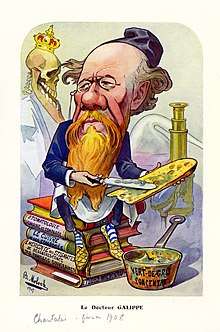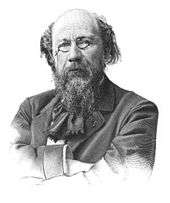Marie Louis Victor Galippe

Marie Louis Victor Galippe (29 May 1848 - February 1922, Autouîl) was a French microbiologist and an eminent physician. He conducted experiments on microbiology in human life and also published notes on a variety of subjects including dental hygiene.
Born to a pharmacist in Grandvilliers, he studied at the Ecole Supérieure de Pharmacie and became a pharmacist before going on to study medicine. He demonstrated by experimenting on himself that copper sulphate was not as toxic as thought. He later made studies on bacteriology and specialized in dental health.[1]

Among his other studies, Galippe examined bacteria present in various parts of cultivated food plants and found them to be nearly always present. He tried growing vegetables with sewage and then cut the plant parts above ground and tested them for bacteria by culturing them. Galippe discovered that the bacteria in the sewage entered all the plant tissues except for the garlic.[2][3][4] Galippe also examined micro-organisms that were preserved in fossil bearing amber.[5][6]
Galippe recovered bacteria from gallstones and hypothesized that they were produced by bacteria. This theory of bacterial causation of gallstones however has little support though viable bacteria have been found within stones even in later studies.[7][8]
References
- ↑ "M. Victor Galippe". La Presse Médicale (14): 279. 18 February 1922.
- ↑ Compant, Stéphane; Sessitsch, Angela; Mathieu, Florence (2012). "The 125th anniversary of the first postulation of the soil origin of endophytic bacteria – a tribute to M.L.V. Galippe". Plant and Soil. 356: 299. doi:10.1007/s11104-012-1204-9.
- ↑ Wight, William W. (1913). Louis XVII. A Bibliography. Boston: T.R.Marvin and Son. p. 70.
- ↑ Lereboullet, P. (1922). "Necrologie. Victor Galippe". Paris médical : la semaine du clinicien (in French) (44): 173.
- ↑ Néraudeau, Didier; Vullo, Romain; Gomez, Bernard; Girard, Vincent; Lak, Malvina; Videt, Blaise; Dépré, Éric; Perrichot, Vincent (2009). "Amber, plant and vertebrate fossils from the Lower Cenomanian paralic facies of Aix Island (Charente-Maritime, SW France)". Geodiversitas. 31: 13. doi:10.5252/g2009n1a2.
- ↑ Galippe, M.V. (1920). "Recherches sur la résistance des microzymas à l'action du temps et sur leur survivance dans l'ambre". Comptes Rendus Hebdomadaires des Séances de l'Académie des Sciences. 170: 856–858.
- ↑ Anonymous (1906). "The etiology of gallstones". Journal of the American Medical Association: 278. doi:10.1001/jama.1906.02510310040006.
- ↑ Hazrah, P.; Oahn, K.T.H.; Tewari, M.; Pandey, A.K.; Kumar, K.; Mohapatra, T.M.; Shukla, H.S. (2004). "The frequency of live bacteria in gallstones". HPB. 6 (1): 28–32. doi:10.1080/13651820310025192.
External links
- Note sur la présence du cuivre dans les céréales, la farine, le pain et diverses autres substances alimentaires
- Note sur la présence du cuivre dans l'extrait de quinquina
- A propos de la stomatite dite aphteuse ; Sur la culture des microzymas de Béchamp